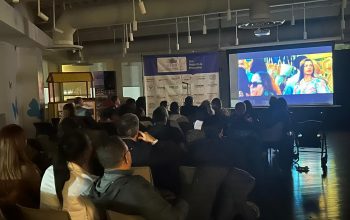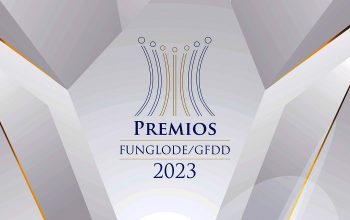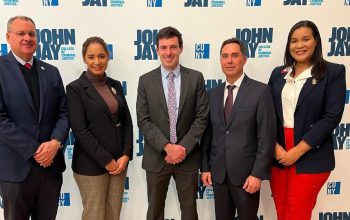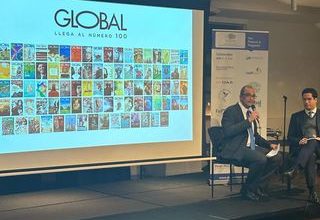news
GFDD and FUNGLODE Feature Dominican Shorts at DC Environmental Film Festival
March 28, 2014
On March 28, as part of its commitment to raising awareness concerning the conservation of the environment through its programs, Global Foundation for Democracy and Development partnered with the Environmental Film Festival in the Nation’s Capital (DCEFF) to showcase four Dominican short films at the GALA Hispanic Theatre in Columbia Heights. DCEFF’s Spanish-language program, which has benefited from GFDD’s collaboration since 2013, has served
to screen Spanish language entries and encourage the involvement and attendance of the Hispanic and international community.
GFDD’s Executive Director, Ms. Natasha Despotovic– who also directed GFDD’s in-house produced short film Garbage or Resource? A Dominican Republic Experience— welcomed the
large audience, and explained how GFDD is pleased to be working in collaboration with the DCEFF for the second year running. Ms. Despotovic went on to say that is was DCEFF which inspired a similar program in the Dominican Republic — the DR Environment Film Festival (DREFF), now in its fourth year and playing in eight cities throughout the country. GFDD and its environmental initiatives, such as DREFF and Globo Verde Dominicano Award (GVDA), serve as bridges to promote a genre of Dominican
environmental filmmaking–both by bringing it here to US and taking international films to the Dominican Republic. Despotovic concluded that initiatives like DREFF and DCEFF have come a long way towards achieving the aims set down in the initial agenda, although there is still more work to be done and GFDD looks forward to continued collaboration in this regard.
Ms. Despotovic then introduced the films and invited the audience to stay for the Q&A session which
took place after the screening. The four Dominican shorts played to a full theatre and were presented in the following order:
1. GFDD’s self-produced 17 minute short, Garbage or Resource? A Dominican Republic Experience (¿Basura o recurso? Experiencia de la República Dominicana), depicts how recycling has become an important economic opportunity for
Dominicans. Through various corporate and educational projects, the viewer observes how– aside from the obvious environmental benefits– recycling enables economic development through the generation of new companies and industries.
2. GVDA’s best 2013 Short Film First Steps (Primeros pasos), describes how Dominican society is taking the initial steps in dealing with the waste management
problem, and how recycling has emerged as both a business alternative and a source of employment.
3. GVDA’s Public Service Announcement Winner My Voice (Mi voz), represents a charming story of two children in a park and how they care for nature.
4. And finally, Death by a Thousand Cuts (Muerte por mil
cortes), which tackles the story of a Haitian charcoal producer who allegedly kills a Dominican Park Ranger on patrol in the Sierra de Bahoruco National Park. The brutal murder points to the larger story of increasing tensions between Haiti and the Dominican Republic over illicit charcoal exploitation and the even larger story of the worldwide struggle over rapidly depleting natural resources.
Following the screenings GFDD convened a panel discussion and Q
& A, consisting of the filmmakers, Natasha Despotovic and Emy Rodriguez (Garbage and Resource?), Sebastian Cabrera, (My Voice), and Jake Kheel, and Juan Yepes (Death by a Thousand Cuts) was held.
The principle questions centered around community education initiatives promoting sustainable waste management practices, the health conditions of dumpster
divers, government incentives to ban or tax the use of plastic bags, and what could be done to diminish the deforestation taking place.
With reference specifically to Death by A thousand Cuts, the film’s director, Jake Kheel, observed that Hispaniola is one island with two completely distinct cultures and a resource conflict which offers a unique case study. With the film, Kheel trusts to make people aware of potential
consequences in hopes that efforts can be carried out to avoid further problems and hopefully spur on movements for positive change.
All the filmmakers generally agreed that by spreading the word and giving examples you can share experiences with individuals at the cutting edge. By screening films free of charge, engaging audiences and at the same time inviting relevant stakeholders, it can help foster dialogue to further advance the green agenda.
It
was further emphasized by the panel that the multiplier effect of a documentary can be very influential in raising awareness, disseminating scientific studies, transmitting and providing inspiring and motivational messages.
About the DCEFF
Founded in 1993, the Environmental Film Festival in the Nation”s Capital, which occurs each March in Washington D.C, has been screening environmental films for over twenty years. The theme
of the festival’s 2014 edition is entitled “Our Cities, Our Planet”, celebrating the development of sustainable and resilient cities, exploring their natural and built environments as they seek to meet environmental and economic needs. This March 18-30, the D.C. the festival will be presenting a record 200 compelling films from 38 countries, including 115 Washington D.C., U.S. and world premieres with over 100 collaborating partners. DCEFF seeks to advance
public understanding of the environment through the power of film.






